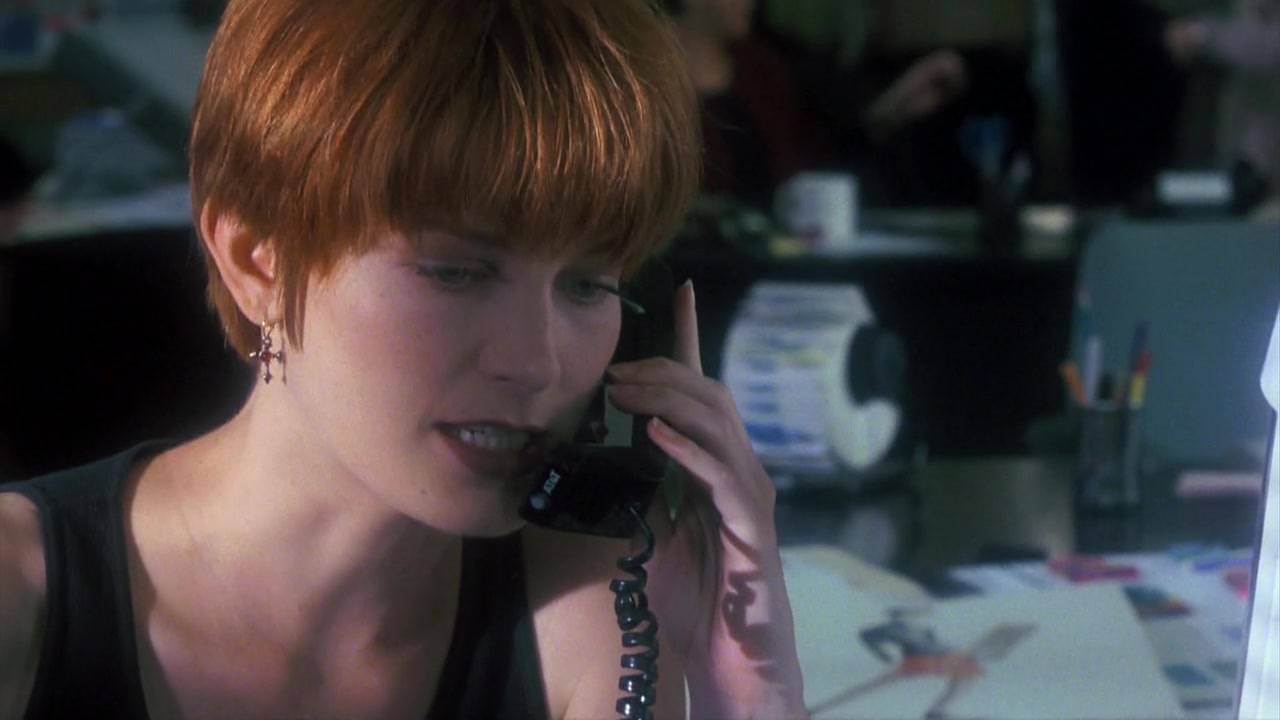Directed by Barbet Schroeder from a script by Don Roos, Single White Female is a curious thriller that explores borderline personality in a way that definitely hasn’t aged very well. But despite this rather strange insensitivity to mental illness, the film is quite gripping, and the tension is always high. In short, I had fun in spite of myself.
The movie opens with a little girl, maybe eight years old or so, looking into a mirror. Only it’s not a mirror. The girl is with her twin, a different person, but also a reflection. The core of the film is in this very brief opening scene.
From there we’re in New York City, looking at the exterior of a castle of an apartment building on the Upper West Side (just a short walk from the Rosemary’s Baby building). The camera pushes in and we’re suddenly in the apartment of Allie (Bridget Fonda) and her fiance Sam (Steven Weber). They’re lying on a mattress in post-coital bliss when Sam’s ex-wife calls. Through cinematic answering machine trickery, Allie finds out that Sam has cheated on her with his ex-wife. So she kicks him out. But what now? She’s a working woman not long in the big city and she needs help paying for her rent-controlled apartment. So she places an ad and after a silly-but-kinda-cute montage of potential roommates from hell, Allie settles on Hedy (Jennifer Jason Leigh), a plainly dressed, friendly sort with a few nervous ticks. What could go wrong?
Well, everything, of course.
Single White Female’s success has almost everything to do with the the strength of the acting by Leigh and Fonda. If we’re going to believe in this quite trashy material, the performances have to be grounded and believable. Only a naturalistic performance will ground the piece, especially in the more melodramatic scenes. I suppose Leigh’s job was probably a bit harder, since she has to appear sweet and vulnerable at first and then slowly morph into her true self — the erotic thriller psycho type that was all over the place in the 90s. Ah well. But Fonda has to go through pretty much the entire emotional spectrum herself, so her job wasn’t easy either. And that ice cold of expression of hers when she’s really angry is something to behold.
The powerful acting by Leigh and Fonda helps to bury some of the obviousness of the script. Don Roos, adapting a much more tame novel by John Lutz, writes a script that’s about as subtle as an axe to the head, though it’s not exactly a paint-by-numbers thriller either. And props to him for writing a gay character that’s surprisingly rounded, especially for the time. Allie’s upstairs neighbor Graham (Peter Friedman) is a tad effeminate, but not the sassy finger-snapping stereotype that was all too common back then.
Certainly, the way that the film deals with borderline personality disorder hasn’t aged very well over the past sixteen years. Early on in the film in a neat bit of reversal of expectations, Allie is snooping through Hedy’s room when she finds a bottle of pills. She holds the pills up to her eyes and studies the label. The audience doesn’t get to see the label, but we know intuitively that it’s an antipsychotic or antidepressant medication of some sort. From our vantage point in the late 2010s, most of us would consider the pills to be a sign of someone working at bettering themselves. But in 1992, this only meant one thing: psycho. That word, plus “crazy”, are thrown around quite a lot. The characters in the film aren’t very kind to Hedy after she starts to act even a bit abnormal.
I had a strange feeling about midpoint in the film that I was actually sympathizing with Hedy a bit. Or maybe even more than just a little. I can see how it would be possible for a variety of outcasts and misfits to identify with her, if only a little.
Schroeder actually figured that this would be the typical response to Hedy, since she’s portrayed fairly sympathetically. But, as he says in the commentary on this Shout! Factory special edition Blu-ray, audiences stood up and cheered when Hedy met her inevitable end. So maybe Schroeder and I are in the minority here, but then both of us like sympathetic portrayals of terribly flawed humans. That Schroeder directed Barfly about the life of Charles Bukowski is not a coincidence. Don Roos, too, admits to identifying most with Hedy, so take that however you want.
Despite its cartoonish treatment of serious mental illnesses as well as an ending that stretches believability, Single White Female is a thoroughly engrossing thriller from beginning to end.
Shout! Factory has once again outdone themselves, and this will, I’m sure, prove to be the definitive edition of this movie.
Some of the coverage you find on Cultured Vultures contains affiliate links, which provide us with small commissions based on purchases made from visiting our site.

